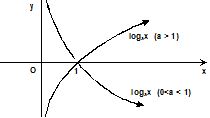Logarithmic function:
The logarithm of a provided number b to the base 'a' is the exponent showing the power to which the base 'a' have to be raised to get the number b. This number is defined as log a b. Therefore log a b = x <=> ax = b, a > 0, a≥1 and b>0. From the basic definition of the logarithm of the number b to the base 'a', we have an identity 
That is called as Fundamental Logarithmic Identity.

Properties of logarithmic function
The function logab is significant for b >0 and for either 0 < a < 1 or a > 1.
Let a > 1, then  and
and
If 0 < a < 1, then 
log a(mn) = log a m + log a n
 , c > 0 and c ¹ 1.
, c > 0 and c ¹ 1.
log a logcb/ logca = log a m - log a n
log a mn = n log a m
 provided both a and b are non-unity.
provided both a and b are non-unity.
loga1 = 0
logaa = 1
